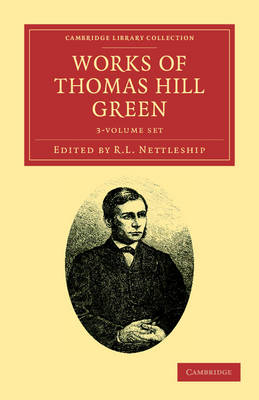Cambridge Library Collection - Philosophy
3 primary works • 5 total works
Volume 1
Works of Thomas Hill Green: Volume 1, Philosophical Works
by Thomas Hill Green
Published 22 December 2011
Thomas Hill Green (1836-82) was one of the most influential English thinkers of his time, and he made significant contributions to the development of political liberalism. Much of his career was spent at Balliol College, Oxford: having begun as a student of Jowett, he later acted effectively as his second-in-command at the college. Interested for his whole career in social questions, Green supported the temperance movement, the extension of the franchise, and the admission of women to university education. He became Whyte's professor of moral philosophy at Oxford in 1878, and his lectures had a lasting influence on a generation of students. Much of Volume 1, edited by Green's pupil R. L. Nettleship and published in 1885, consists of Green's work on David Hume (1711-76). In his essay, 'Introductions to Hume's Treatise of Human Nature' (originally published in 1874), Green gives a detailed critique of Hume's metaphysical thought.
Volume 2
Works of Thomas Hill Green: Volume 2, Philosophical Works
by Thomas Hill Green
Published 22 December 2011
Thomas Hill Green (1836-82) was one of the most influential English thinkers of his time, and he made significant contributions to the development of political liberalism. Much of his career was spent at Balliol College, Oxford: having begun as a student of Benjamin Jowett, he later acted effectively as his second-in-command at the college. Interested for his whole career in social questions, Green supported the temperance movement, the extension of the franchise, and the admission of women to university education. He became Whyte's professor of moral philosophy at Oxford in 1878, and his lectures had a lasting influence on a generation of students. Volume 2, published in 1886, consists of Green's unpublished lecture notes. The Lectures on the Principles of Political Obligation drew criticism upon Nettleship, Green's pupil and editor, for his editorial interventions: the idea of 'common good' was thought to vary significantly here from Green's other writings.
Volume 3
Thomas Hill Green (1836-82) was one of the most influential English thinkers of his time, and he made significant contributions to the development of political liberalism. Much of his career was spent at Balliol College, Oxford: having begun as a student of Benjamin Jowett, he later acted effectively as his second-in-command at the college. Interested for his whole career in social questions, Green supported the temperance movement, the extension of the franchise, and the admission of women to university education. He became Whyte's professor of moral philosophy at Oxford in 1878, and his lectures had a lasting influence on a generation of students. Volume 3, published in 1888, contains a memoir by Nettleship, Green's pupil and editor, drawing on Green's recollections, as well as the memories of friends and family. The rest of the volume consists of essays on topics ranging from Aristotle to Christian dogma.
Thomas Hill Green (1836-82) was one of the most influential English thinkers of his time, and he made significant contributions to the development of political liberalism. Much of his career was spent at Balliol College, Oxford: having begun as a student of Benjamin Jowett, he later acted effectively as his second-in-command at the college. Interested for his whole career in social questions, Green worked on the commission which led to the Endowed Schools Act of 1869, and supported the temperance movement, the extension of the franchise, and the admission of women to university education. He became Whyte's professor of moral philosophy at Oxford in 1878, and his lectures had a lasting influence on a generation of students of philosophy and political thought. This collection of Green's writings, published in three volumes from 1885 to 1888, was edited by R. L. Nettleship (1846-92), one of his Balliol students.
Works of Thomas Hill Green: Volume 3, Miscellanies and Memoirs
by Thomas Hill Green
Published 5 November 2015
Thomas Hill Green (1836-82) was one of the most influential English thinkers of his time, and he made significant contributions to the development of political liberalism. Much of his career was spent at Balliol College, Oxford: having begun as a student of Benjamin Jowett, he later acted effectively as his second-in-command at the college. Interested for his whole career in social questions, Green supported the temperance movement, the extension of the franchise, and the admission of women to university education. He became Whyte's professor of moral philosophy at Oxford in 1878, and his lectures had a lasting influence on a generation of students. Volume 3, published in 1888, contains a memoir by Nettleship, Green's pupil and editor, drawing on Green's recollections, as well as the memories of friends and family. The rest of the volume consists of essays on topics ranging from Aristotle to Christian dogma.


